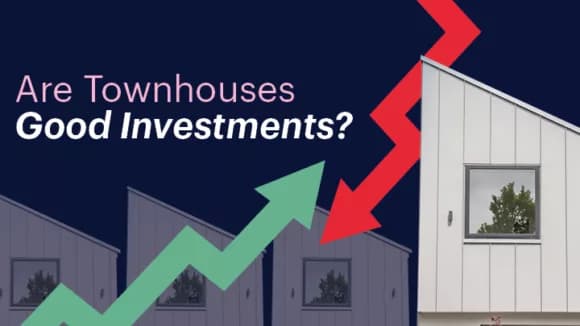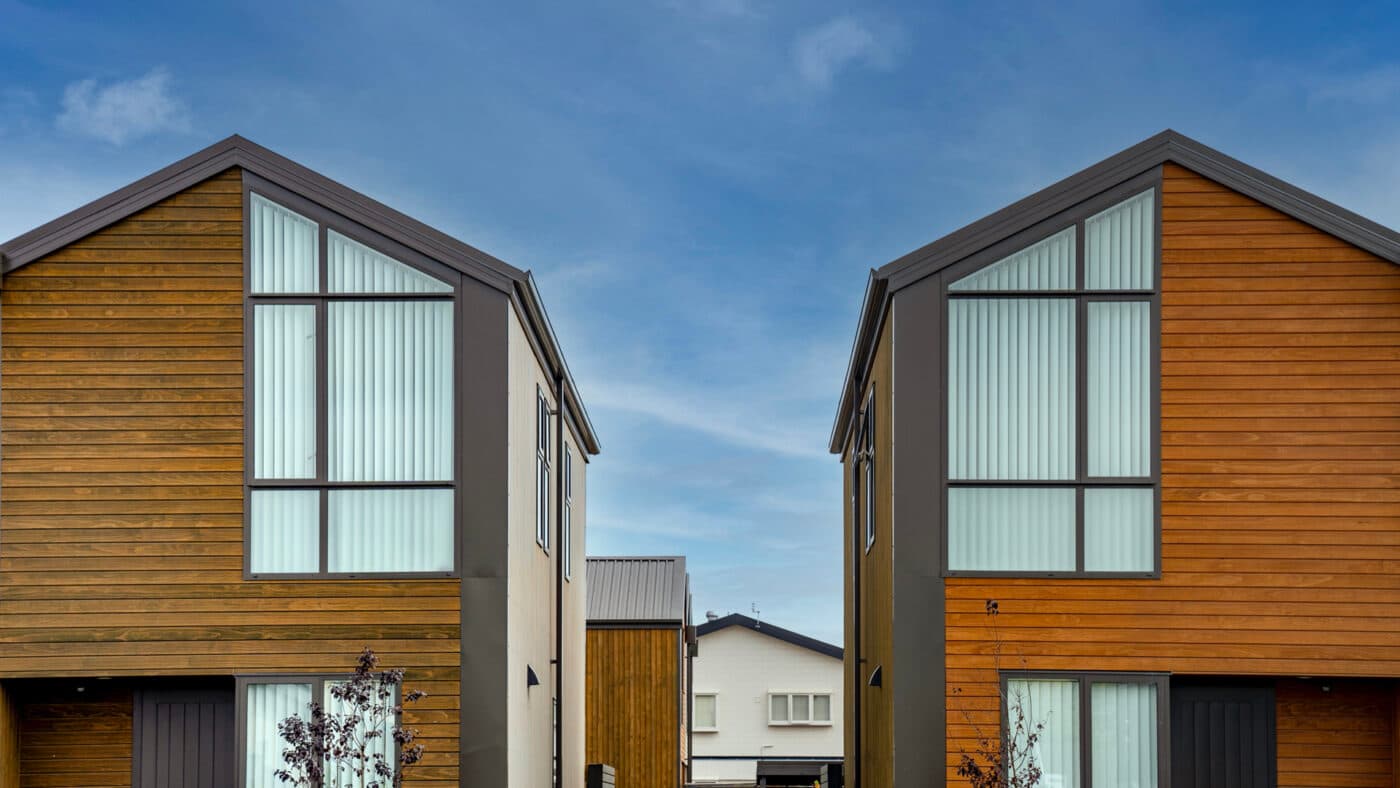
Property Types
Townhouses - Are they a good investment? An honest review
Thinking about investing in a townhouse? Here is an honest review of the pros and cons and whether this option is the right fit for your investment portfolio.
New Builds
6 min read

Author: Ed McKnight
Resident Economist, with a GradDipEcon and over five years at Opes Partners, is a trusted contributor to NZ Property Investor, Informed Investor, Stuff, Business Desk, and OneRoof.
Reviewed by: Laine Moger
Journalist and Property Educator, holds a Bachelor of Communication (Honours) from Massey University.
You drive through your street or suburb and look out the window … builders are putting up townhouses everywhere.
If you live in a New Zealand city, this probably isn’t just a dream.
You start wondering: ‘Are we building too many? Do we already have an oversupply of them?’
So in this article, we’ll look at the data to find out if there truly is an oversupply of townhouses in New Zealand.
Though just before we get into it. Here at Opes Partners we help Kiwis invest in New Build properties. Some of the properties we recommend are townhouses.
So you might think I’m going to say “No oversupply to see here. In fact there’s not enough townhouses!”
I’m not going to say that. Instead my approach is simple. I’ll lay out the data (the good and the bad) as unbiased as I can.
Then I’ll take a step back so you can make that decision for yourself about whether you think there’s an oversupply.
A townhouse is a property that fits the footprint of a standalone home ... just on a smaller plot of land.
Most are 2 to 3 storeys, with a private patio and either a garage or off-street car park. They’re often built in rows, sharing at least one wall (sometimes more).

To figure out if there’s an oversupply of townhouses … we need to figure out whether supply is going up faster than demand.
It’s easy to see the supply-side. There seems to be townhouses popping up everywhere.
Townhouses are being built at three times the rate they were a decade ago.
In major centres like Auckland and Christchurch, over half of all new homes going through consent are townhouses.
So there definitely has been an increase in supply, at least compared to a decade ago. But, what about the demand side?
Because it takes two to create an oversupply. You need both rising supply … and demand lagging behind.
If people are willing to buy these recently built townhouses … then there’s no oversupply.
The truth is, it’s hard to quantify the demand just for townhouses.
Because the demand for townhouses changes based on the price of apartments and standalone houses.
For instance, if standalone houses get more expensive, then more people will opt for a townhouse.
If houses get comparatively cheaper, then buyers will switch away from townhouses and buy a house instead.
That’s why it’s easier to become a data-doctor. Doctors look for the symptoms of an illness to make their diagnosis. If you have a sniffle and a scratchy throat you probably have the flu.
We can take the same approach with this question. Because we already know the symptoms of an oversupply. If we see:
Then we can be pretty confident that there is an oversupply. So let’s look for the symptoms before we make our diagnosis.
Theory: If there is an oversupply, the price of townhouses should fall faster than other types of properties.
New Zealand’s property prices peaked in November 2021. If there was an oversupply of townhouses, then the prices of townhouses should fall faster than houses.
Do we see that? Not really.
Since the peak in Auckland, the median sale price of a house is down 24%. The median sale price of a townhouse is down 18%.
In Christchurch, it’s the other way around: the average house price is down 7%, the average townhouse is down 9%.
Of course, there are month-by-month differences. Sometimes townhouses fall in value more quickly. Other months houses have the bigger fall.
In the world of economics, these numbers are similar. And it doesn’t appear that there is a massive oversupply that is causing the price of townhouses to crash, while houses are tickety-boo.
Both property types have fallen in value by a reasonably similar amount.
Theory: If there is a recently created oversupply of townhouses, it should take longer and longer to sell a townhouse.
This is because if there’s too many townhouses there would be lots of sellers and few buyers.
So do we see that? Again, not really.
Look at Christchurch, there have been times where townhouses took longer to sell, but over the last 23 years they’ve been roughly the same.
On average, townhouses typically take 2.6 days longer to sell compared to a house.
Right now, a townhouse takes 3.4 days longer to sell.
So, even with all this townhouse building, they only take 0.8 days extra to sell compared to the long-term average.
That’s not screaming massive oversupply to me.
Theory: If there is a recently created oversupply, townhouse prices should go up more slowly than houses.
Historically, houses have risen slightly faster than townhouses, but the difference is marginal.
In Christchurch, townhouses went up in value 0.1% more slowly than houses in the average year.
It’s basically a rounding error.
In the most recent boom and downturn, townhouse inflation was higher than houses. Then townhouse sale prices didn’t drop as far during the downturn.
Because of that house sale prices are recovering a little better than townhouses right now.
But if we’re talking symptoms. This is more of a scratch than a gash.
This data will surprise many people. Because when you drive to work on your daily commute, you probably see a lot of building going on.
So how is it that we see all this townhouse building … but we don’t see the symptoms of an oversupply?
The answer is, buyers are stepping forward. And New Zealanders are changing how they live. There are 4 main reasons why:
In Auckland, townhouses have historically been around 20% cheaper than standalone houses – and today, that gap is closer to 30%.
Houses are expensive. So rather than renting for their whole lives trying to save for a house deposit, some Kiwis will opt for a townhouse instead.
For many Kiwis, the choice isn’t “House vs Townhouse” – it’s “Townhouse or Nothing.” So the demand shifts.
On top if that, we’re having smaller families. So each household has fewer people.
We’re marrying later, having fewer children, and living in smaller households.
So we don’t all need 4-bed homes with big backyards anymore. Smaller homes do the job.
Many of the townhouses under construction are already sold. That’s because developers usually need 75–100% pre-sales to get funding from their lender.
So the homes you see being built aren’t all coming to the market at the same time. Many of them already have buyers lined up.
Renters are changing what they want, too. In May 2025, there were 708,000 searches for 2-bedroom properties on Trade Me.
Compare that to 267,000 searches for 4-bedroom properties in the same month.
Tenants are more interested in 2 and 3-bedroom properties compared to larger 4+ bedroom properties.
And the truth is that there are more 2-bedroom townhouses than there are 2-bedroom houses.
Dr. Stuart Donovan, a senior fellow at Motu, describes the shift as a move toward “compact quality”.
This is especially in cities where space and money are tight. (If you live in a rural area, you're more likely to have a bigger home).
We are having smaller families, so we need less space. But we want a higher quality of living.
Developers have responded to this change in demand by building smaller, better-designed properties. More Kiwis are moving towards a 2-bedroom, 2-bath property rather than a 3-bedroom, 1-bath property.
There will be some people who will say: “There’s an oversupply – I can see in on the street!”
But remember: lots of supply doesn’t mean oversupply.
What matters is the balance between demand and supply. Not just supply itself.
Resident Economist, with a GradDipEcon and over five years at Opes Partners, is a trusted contributor to NZ Property Investor, Informed Investor, Stuff, Business Desk, and OneRoof.
Ed, our Resident Economist, is equipped with a GradDipEcon, a GradCertStratMgmt, BMus, and over five years of experience as Opes Partners' economist. His expertise in economics has led him to contribute articles to reputable publications like NZ Property Investor, Informed Investor, OneRoof, Stuff, and Business Desk. You might have also seen him share his insights on television programs such as The Project and Breakfast.
This article is for your general information. It’s not financial advice. See here for details about our Financial Advice Provider Disclosure. So Opes isn’t telling you what to do with your own money.
We’ve made every effort to make sure the information is accurate. But we occasionally get the odd fact wrong. Make sure you do your own research or talk to a financial adviser before making any investment decisions.
You might like to use us or another financial adviser